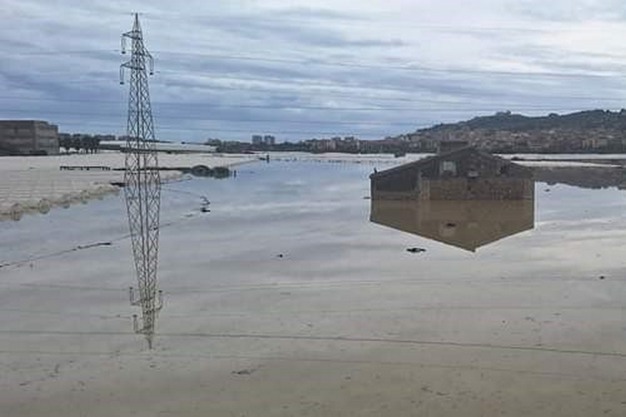The weather was unseasonable in Sicily for most of 2023 until December, and part of January 2024. This led to an overproduction of horticultural crops that depreciated their value, with marketing normalizing only in February of this year.
 Flooded tunnels in Licata on Saturday 19 October 2024
Flooded tunnels in Licata on Saturday 19 October 2024
Then, after a heat wave and drought that lasted months, torrential rain fell on the island on the morning of Saturday 19 October (and for most of the day), flooding entire towns and the countryside. Among them was the area of Licata (AG), where there is a dense concentration of greenhouses for intensive horticulture. Giovanni Chianta, a horticultural producer in the area, reports that "the flooding of the Salso river caused extensive damage in some districts in Licata. Many farms have been submerged and destroyed. It will be crucial to give immediate answers to producers. We ask that the farms affected by the flood caused not only by the Salso river, but also by the torrents, as in Tenutella (Butera), be compensated quickly."
Press reports indicate that the mayor of Licata himself, Angelo Balsamo, is at work together with volunteers and municipal employees to shovel the mud that has submerged the local fruit and vegetable market and the railway station. After months of hard work, entire crops of bell peppers, eggplants and zucchini, which were ready for harvesting, have been completely destroyed. The fertile plain of Licata was transformed into a lake in a matter of just a few hours, with crops and greenhouses invaded by water. The damage is estimated at millions of euro.
Medium-term responses are now needed in addition to emergency ones, because the problems are structural. Licata was flooded in 1976 as well, after a long period of drought. "In these long 48 years, local farmers have periodically suffered extensive damage due to the water from half of Sicily (including from the dams) concentrating in the Salso basin, to be discharged directly into the sea. However, during the drought, they have never received water for irrigation use, from any dam. A response is needed to address the issue on a structural level, to make the territory safe."
Floods caused by heavy rainfall concentrated in just a few hours are events that are difficult to avoid, but whose effects can and must be managed better for the safety of people and the security of companies. And, while there has been talk of drought for months, no one has taken steps to clean the reservoirs and watercourses, resulting in a new flood due also to the poorly-maintained riverbeds. Less than a month ago, in an interview with agrometeorologist Luigi Pasotti, it emerged that "the increase in temperatures caused by anthropogenic climate change, is significantly aggravated by the impact of low rainfall." He also highlighted how the average soil moisture levels recorded between October 2023 and May 2024 in Sicily (Copernicus data) had been exceptionally lower than those recorded in the previous 30 years (since 1995). "All these phenomena contribute to the loss of soil nutrients. This opens up a new, problematic front that fruit and vegetable producers and others will have to deal with."
The recent rainfall, on the other hand, highlights how an area without any planned management is destined to be at the mercy of the most extreme natural phenomena, which signal an epochal change.
